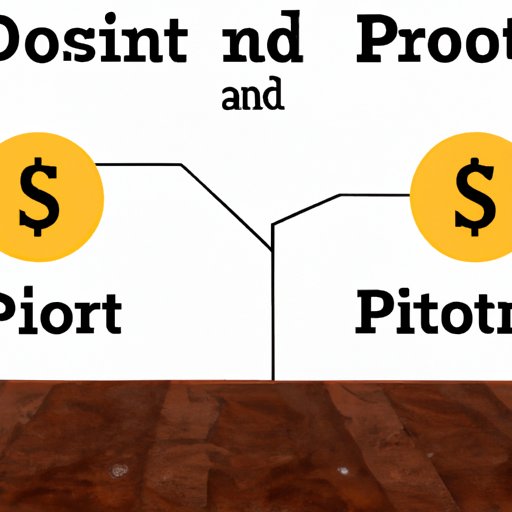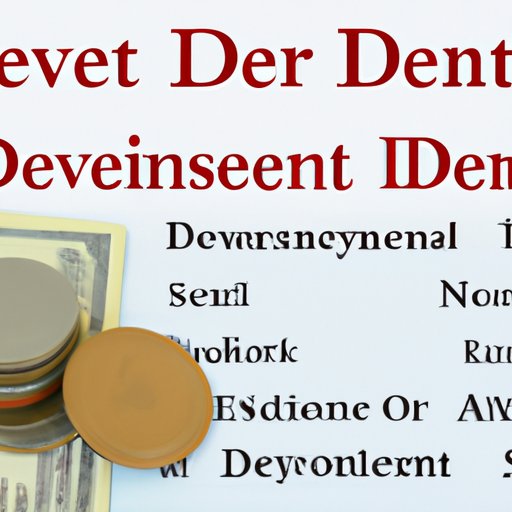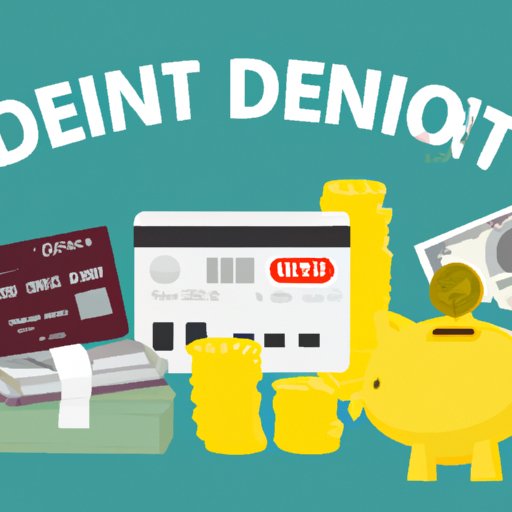Introduction
The age-old question of whether to invest or pay off debt is one that many people face when considering their personal finances. With the potential to increase wealth over time, investing can be an attractive option to pursue. On the other hand, paying off debt can help improve cash flow and reduce stress. To make the best decision for your financial situation, it’s important to understand the advantages and disadvantages of both options. This article will explore the pros and cons of investing versus paying off debt and provide strategies for balancing the two.

Analyzing the Pros and Cons of Investing vs. Paying Off Debt
Investing and paying off debt are both viable options for managing your finances. However, each has its own set of advantages and disadvantages. Understanding these benefits and drawbacks can help you make the best decision for your situation.
Advantages of Investing
Investing can be a great way to increase wealth over time. According to Investopedia, “the goal of investing is to put your money to work in one or more types of investment vehicles in the hopes of growing your money over time.” Investing can also provide tax benefits, depending on the type of investment. For example, investments in stocks, bonds, mutual funds, and ETFs can all be held in a tax-advantaged retirement account such as an IRA or 401(k).
Disadvantages of Investing
Investing does come with risks, including the potential for loss of principal. Additionally, investing can require a significant amount of research and knowledge in order to make informed decisions. Investing can also be costly, as there are often fees associated with trading and managing investments.
Advantages of Paying Off Debt
Paying off debt can be a great way to improve cash flow and reduce stress. When you pay off debt, you no longer have to worry about making monthly payments or incurring interest charges. According to a study conducted by Experian, “the average American household carries nearly $7,000 in credit card debt, and the average interest rate on those cards is around 19%.” By paying off this debt, you can save money on interest charges and free up additional cash flow each month.
Disadvantages of Paying Off Debt
The primary disadvantage of paying off debt is that you may not be able to take advantage of potential market gains if you don’t have any money left to invest. Additionally, paying off debt can take a long time, depending on the size of the debt and the amount of money you have available to pay it off. It can also require a significant amount of discipline to stay on track.

Exploring the Financial Benefits of Investing Versus Paying Off Debt
When deciding whether to invest or pay off debt, it’s important to consider the financial implications of each option. The impact of interest rates on investment returns and the tax implications of investing and paying off debt should both be taken into account.
Impact of Interest Rates on Investment Returns
The interest rate you pay on your debt can have a significant impact on the return you get from investing. For example, if you have a credit card with a 19% interest rate, you need to earn more than 19% on your investments in order to make it worth your while. The higher the interest rate, the harder it becomes to achieve a positive return on your investments.
Tax Implications of Investing and Paying Off Debt
The tax implications of investing and paying off debt can also affect your decision. For instance, if you invest in a taxable account, you may be subject to taxes on any capital gains you receive. On the other hand, if you pay off debt, you won’t be subject to any taxes. It’s important to consider the tax implications of both options before making a decision.

Examining the Impact of Investing Money Instead of Paying Off Debt
When considering whether to invest or pay off debt, it’s important to understand the potential risks and rewards of each option. Investing comes with the potential for loss of principal, while paying off debt comes with the opportunity cost of not having the money available to invest.
Potential Risk of Investing
Investing comes with the risk that you could lose money. As with any investment, there is no guarantee of a positive return. It’s important to understand the risks before investing and to diversify your investments to reduce your exposure to risk.
Opportunity Cost of Paying Off Debt
Paying off debt can also come with an opportunity cost. If you choose to pay off debt instead of investing, you may miss out on potential market gains. It’s important to weigh the risks and rewards of investing versus paying off debt before making a decision.
Understanding the Risk-Reward Trade-Offs of Investing or Paying Down Debt
When deciding whether to invest or pay down debt, it’s important to understand the risk-reward trade-offs of each option. Calculating your personal risk tolerance and assessing the risks of investing or paying down debt can help you make the best decision for your situation.
Calculating Your Personal Risk Tolerance
Before making any decisions about investing or paying off debt, it’s important to calculate your personal risk tolerance. Everyone’s risk tolerance is different, so understanding your own risk tolerance is key to making the best decision for your situation. A financial advisor can help you determine your risk tolerance and recommend appropriate investment strategies.
Assessing the Risks of Investing or Paying Down Debt
It’s also important to assess the risks of investing or paying down debt. Investing comes with the potential for loss of principal, while paying off debt comes with the opportunity cost of not having the money available to invest. It’s important to understand the risks and rewards of each option before making a decision.
Determining the Best Course of Action for Your Personal Financial Situation
When deciding whether to invest or pay off debt, it’s important to evaluate your current financial position and analyze your future goals. Taking a holistic approach to managing your finances can help you make the best decision for your situation.
Evaluating Your Current Financial Position
Before you decide whether to invest or pay off debt, it’s important to evaluate your current financial position. Take stock of your income, expenses, and debt levels to determine how much money you have available to invest or pay off debt. This will help you determine your best course of action.
Analyzing Your Future Goals
It’s also important to analyze your future goals when deciding whether to invest or pay off debt. Consider your short-term and long-term goals and determine which option will help you reach them. Having a clear picture of where you want to be in the future can help you make the best decision for your financial situation.
Investigating Different Strategies for Balancing Investing and Paying off Debt
Once you’ve evaluated your current financial position and analyzed your future goals, it’s time to explore different strategies for balancing investing and paying off debt. There are several methods you can use to balance the two, including the debt snowball method, the debt avalanche method, and the 50/50 method.
The Debt Snowball Method
The debt snowball method involves paying off your smallest debts first and then working your way up to the larger ones. This method can help you build momentum and stay motivated as you work toward becoming debt-free.
The Debt Avalanche Method
The debt avalanche method focuses on paying off your highest-interest debts first. This can help you save money on interest charges and become debt-free faster.
The 50/50 Method
The 50/50 method involves splitting your available funds between paying off debt and investing. This can be a good option if you have limited funds available and want to take advantage of potential market gains while also reducing your debt.
Conclusion
Deciding whether to invest or pay off debt can be a difficult decision. It’s important to understand the pros and cons of both options and weigh the financial implications before making a decision. Additionally, evaluating your current financial position, analyzing your future goals, and exploring different strategies for balancing investing and paying off debt can help you make the best decision for your situation. Ultimately, the best course of action depends on your personal financial situation and goals.
(Note: Is this article not meeting your expectations? Do you have knowledge or insights to share? Unlock new opportunities and expand your reach by joining our authors team. Click Registration to join us and share your expertise with our readers.)
